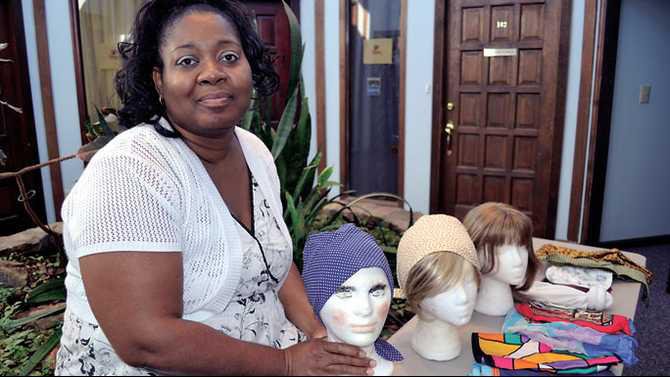Look Good, Feel Better
When: Nov. 5, 10 a.m. - noon
Where: Rockdale Medical Center
Price: free, but registration required. Call the American Cancer Society: 1-800-227-2345.
For more info: www.lookgoodfeelbetter.org or call Bernadette Chang at 404-582-6122
Any woman knows your appearance can make or break your day. But for women going through cancer, maintaining appearances can be a critical part in the battle to survive.
The Look Good Feel Better program, a part of the American Cancer Society, has been helping for more than two decades by teaching women going through chemotherapy and radiation tips on taking care of their appearance and handling the changes in their hair and body.
“It does help the woman to stand her ground and say I may look a little different but I can see myself again,” said Bernadette Chang with the American Cancer Society’s South Atlantic Division.
Each participant receives a kit of donated makeup and a wig, or a “cranial prosthesis.” Volunteer licensed cosmetologists are trained in techniques specially for women going through chemotherapy and radiation who might be experiencing hair loss or dry skin.
For many women, dealing with the changes from chemotherapy can be used as an opportunity to experiment and try new identities.
“Oh yeah, they get involved in it and encourage each other to try different things,” said Connie Gray, a licensed cosmetologist who’s been teaching the Look Good Feel Better classes in Rockdale since 2005. “That’s the object, for them to look better and try different things they haven’t tried before.”
Conyers resident and former Rockdale Medical employee Linda Chandler enjoyed the class so much that she ended up taking it twice — despite the fact she comes from a Pentecostal background and doesn’t wear makeup.
“It lifted spirits,” she said. “I could see that all the ladies really enjoyed it. It was a joy to me to see some of them pretty low, and by the time they got ready to leave, we were all laughing. It was like a girl party.”
In the class, they learned how to create a turban out of a T-shirt and were able to try on different wigs. When the newly wigged Chandler ran into a former co-worker, the co-worker didn’t recognize her without her signature long, white hair.
“She and I had a good laugh together,” said Chandler. “When I lost all my hair, nothing ever looked right except my own.”
For Conyers resident Lidia Duque, support from groups like Look Good Feel Better made all the difference in helping her know she was not alone. Since she’d been in the United States for only two years, she had no family nearby. Duque’s biggest support system has been her husband, her friend and interpreter Sonya Curbelo, her doctors, her church family, and her support groups.
Curbelo, serving as interpreter, said for Duque, “Because this was the first time having this type of disease, she didn’t know what to expect.”
“There were some insecurities, and she felt different.”
Attending the class taught Duque not to feel sorry for herself. It taught her how to cope with the feeling of having the disease, and the support system gave her a sense of comfort knowing she is not the only one going through this.
For the 71-year-old Chandler, being with other women going through the same life changes created a unique bond.
“It was a difficult time even at my age to realize I had cancer,” she said. It was a comfort “just being with other people going through the same thing, going through chemo, going through the changes in their body and their life.”
“You can have fun,” said Chandler. “You can have a nice time no matter what situation you’re in, if you choose to.”
Erika Rodriguez contributed to this article




